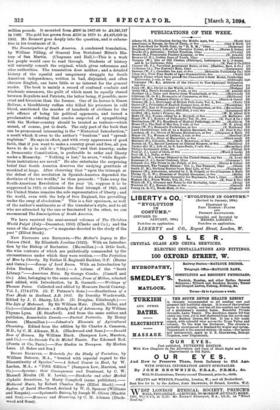The Emancipation of South America. A condensed translation, by William
Pilling, of General Don Bortolome Mitre's His- tory of San Martin. (Chapman and Hall.)—This is a *ork few people would care to read through. Students of history will naturally consult the original, which gives references and cites authorities. The translation does neither ; and a detailed history of the squalid and sanguinary struggle for South American independence, written in bad, disjointed, and often obscure English, can have little or no interest for the general reader. The book is mainly a record of confused combats and wholesale massacres, the guilt of which must be equally shared between Royalists and Patriots, the latter being, if possible, more cruel and ferocious than the former. One of its heroes is Simon Bolivar, a bloodthirsty ruffian who killed his prisoners in cold blood, sanctioned the murder of hundreds of civilians for the sole offence of being his political opponents, and issued a proclamation ordering that creoles suspected of sympathising with the Mother-country should be treated as traitors—which meant, of course, put to death. The only part of the book that can be pronounced interesting is the "Historical Introduction," a merit which it owes to the author's " bunkum " and " spread- eagleism." He says in effect, and with every appearance of good faith, that if you want to make a country great and free, all you have to do is to call it a "Republic," and that Anarchy, under a Democratic Constitution, is preferable to order and liberty under a Monarchy. "Nothing is lost," he avers, "while Repub- lican institutions are saved." He also entertains the surprising belief that South America deserves the undying gratitude of mankind at large. After observing that "upon the triumph or the defeat of the revolution in Spanish-America depended the destinies of the two worlds," he thus proceeds : "Take away the South-American Revolution of the year '10, suppose it to be suppressed in 1820, or eliminate the final triumph of 1825, and the United States remains the sole representative of liberty ; and the world, even with the help of free England, lies grovelling under the sway of absolutism." This is a fair specimen, as well of the author's sentiments as of the translator's style, and to all who are attracted by the one or fascinated by the other, we can recommend The Emancipation of South America.






































 Previous page
Previous page